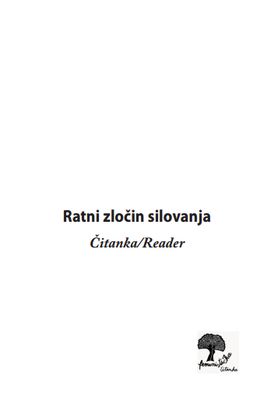
We kindly inform you that, as long as the subject affiliation of our 300.000+ articles is in progress, you might get unsufficient or no results on your third level or second level search. In this case, please broaden your search criteria.




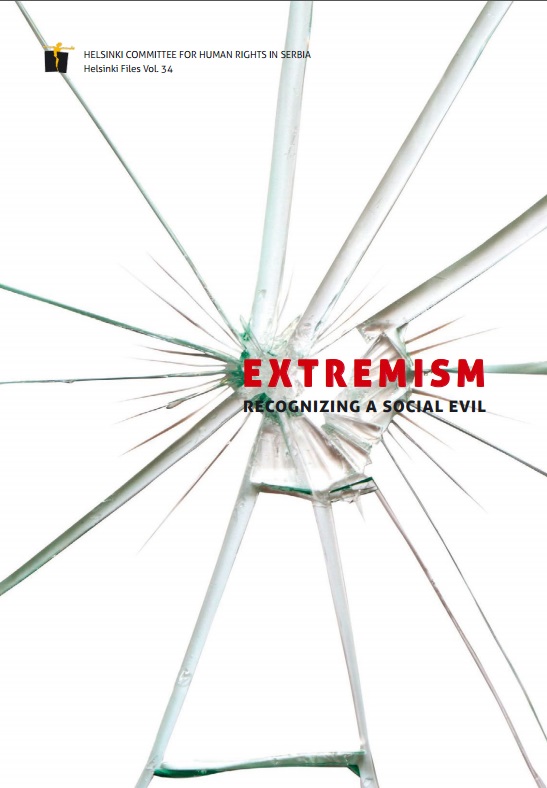
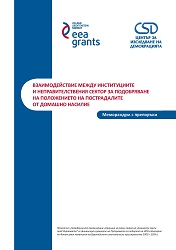
The initiative ‘Civic Organizations: a Guarantee for Equal Rights of Vulnerable Groups before the State’ encompasses four vulnerable groups: persons deprived of their liberty, victims of human trafficking and domestic violence, as well as persons in need of international protection and other vulnerable foreigners. Although very different, those communities encounter similar problems in their relations with institutions: insufficient human and financial resourcing, work practices not always meeting the needs of vulnerable groups. Thus, oftentimes those persons rely on civil society for improving their status, including through assistance before the respective competent authorities. Throughout its different stages, the initiative outlined the profile of the vulnerable groups, their relations with institutions and NGOs and promising foreign experience and practices applicable in the Bulgarian environment. A Concept for More Effective Civic Participation in the Assistance to Vulnerable Groups was developed, proposing further practical steps. The four memoranda (Co-operation between institutions and NGOs in improving the status of domestic violence victims; Co-operation between institutions and NGOs in improving the status of victims of human trafficking; Co-operation between institutions and NGOs in improving the status of persons deprived of their liberty; Co-operation between institutions and NGOs in improving the status of persons seeking international protection and other vulnerable foreigners) contain specific recommendations to institutions, working with the vulnerable groups, based on the Concept and the opinions of various state authorities and civil society representatives.
More...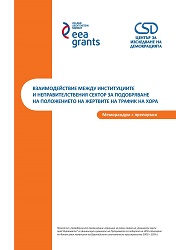
The initiative ‘Civic Organizations: a Guarantee for Equal Rights of Vulnerable Groups before the State’ encompasses four vulnerable groups: persons deprived of their liberty, victims of human trafficking and domestic violence, as well as persons in need of international protection and other vulnerable foreigners. Although very different, those communities encounter similar problems in their relations with institutions: insufficient human and financial resourcing, work practices not always meeting the needs of vulnerable groups. Thus, oftentimes those persons rely on civil society for improving their status, including through assistance before the respective competent authorities. Throughout its different stages, the initiative outlined the profile of the vulnerable groups, their relations with institutions and NGOs and promising foreign experience and practices applicable in the Bulgarian environment. A Concept for More Effective Civic Participation in the Assistance to Vulnerable Groups was developed, proposing further practical steps. The four memoranda (Co-operation between institutions and NGOs in improving the status of domestic violence victims; Co-operation between institutions and NGOs in improving the status of victims of human trafficking; Co-operation between institutions and NGOs in improving the status of persons deprived of their liberty; Co-operation between institutions and NGOs in improving the status of persons seeking international protection and other vulnerable foreigners) contain specific recommendations to institutions, working with the vulnerable groups, based on the Concept and the opinions of various state authorities and civil society representatives.
More...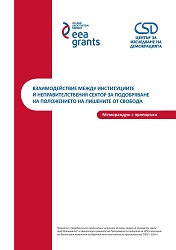
The initiative ‘Civic Organizations: a Guarantee for Equal Rights of Vulnerable Groups before the State’ encompasses four vulnerable groups: persons deprived of their liberty, victims of human trafficking and domestic violence, as well as persons in need of international protection and other vulnerable foreigners. Although very different, those communities encounter similar problems in their relations with institutions: insufficient human and financial resourcing, work practices not always meeting the needs of vulnerable groups. Thus, oftentimes those persons rely on civil society for improving their status, including through assistance before the respective competent authorities. Throughout its different stages, the initiative outlined the profile of the vulnerable groups, their relations with institutions and NGOs and promising foreign experience and practices applicable in the Bulgarian environment. A Concept for More Effective Civic Participation in the Assistance to Vulnerable Groups was developed, proposing further practical steps. The four memoranda (Co-operation between institutions and NGOs in improving the status of domestic violence victims; Co-operation between institutions and NGOs in improving the status of victims of human trafficking; Co-operation between institutions and NGOs in improving the status of persons deprived of their liberty; Co-operation between institutions and NGOs in improving the status of persons seeking international protection and other vulnerable foreigners) contain specific recommendations to institutions, working with the vulnerable groups, based on the Concept and the opinions of various state authorities and civil society representatives.
More...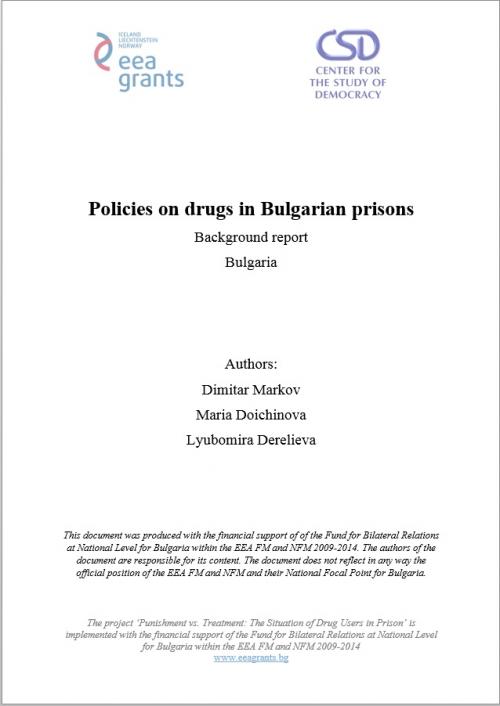
This report provides a snapshot of the situation of drug users in Bulgaria. As it is aimed to serve as a basis for comparative study on policies and practice towards drug users, particularly in prisons, in Bulgaria and Norway, it presents the country’s context – general information on the country and its criminal justice system, policy and legislation on drugs explaining what are the perimeters of drug restriction and what are the national policies towards drug use. This information is illustrated with statistics on crime rates and drug crime in particular. The report also investigates how court looks upon the fact that the accused are using or addicted to narcotic substances within the criminal proceedings and specifically on the type and the term of the sentence. Finally, it looks upon the sanctions available for drug users and their situation once sentenced to imprisonment – what treatment, rehabilitation and harm reduction programmes are available in different prisons.
More...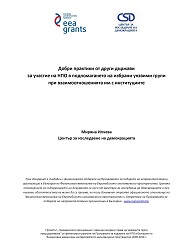
In order to contribute to the improvement of the situation of Bulgarian NGOs, providing support to selected vulnerable groups – prisoners, victims of trafficking and domestic violence, persons seeking international protection and other vulnerable foreigners – this report presents a selection and summary of good practices from EU Member States, donor states Iceland, Liechtenstein and Norway and countries outside of Europe. The practices have been identified by studying printed and electronic publications of foreign entities and comparative reports of international organisations on the legislation, policies and practices in different countries. Part of the information has been collected via foreign partners of the Center for the Study of Democracy under projects, related to the selected vulnerable groups and the capacity building of civic organisations.
More...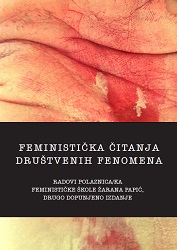
Od nastanka svijeta pa do danas bivstvuje i nasilje kao oblik (ne)prihvaćenog ponašanja i socijalne interakcije među pojedincima_kama, grupama ljudi, državnog sistema i globalne politike. Definiranje nasilja je jedan od najtežih zadataka s obzirom na širok spektar aktivnosti koje obuhvata. Svjetska zdravstvena organizacija (WHO) definira nasilje kao „namjerno korištenje fizičke sile i moći prijetnjom ili postupkom prema samom_oj sebi, prema drugoj osobi ili prema grupi ljudi ili čitavoj zajednici, što bi moglo rezultirati ili rezultira ozljedom, smrću, psihološkim posljedicama, nerazvijenošću ili deprivacijom.“ Nasilje kao društveni fenomen je uvijek pitanje moći pojedinca_ke, grupe ljudi, institucije ili države. U izvještaju Svjetske zdravstvene organizacije o globalnom statusu prevencije nasilja iz 2014. godine navedeno je da više od 1,3 miliona ljudi diljem svijeta umre svake godine kao rezultat nasilja u svim njegovim oblicima (nasilje prema samom_oj sebi, međuljudsko i kolektivno nasilje), što predstavlja 2,5% globalne smrtnosti.
More...
Kosovski reditelj Isa Qosja nije od onih koji su češće na crvenom tepihu već u vlastitoj dnevnoj sobi, niti je od onih čije će fotografije dnevne sobe krasiti stranice šarenih magazina. U vremenu površnosti i koncentracije konzumenta/ice na sadržaj u maksimalnom trajanju od 15 minuta, ni Qosjin opus nije previše blizak široj publici.
More...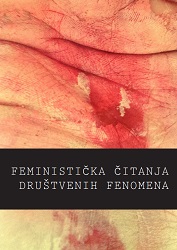
Od nastanka svijeta pa do danas bivstvuje i nasilje kao oblik (ne) prihvaćenog ponašanja i socijalne interakcije među pojedincima_kama, grupama ljudi, državnog sistema i globalne politike. Definiranje nasilja je jedan od najtežih zadataka s obzirom na širok spektar aktivnosti koje obuhvata. Svjetska zdravstvena organizacija (WHO) definira nasilje kao „namjerno korištenje fizičke sile i moći prijetnjom ili postupkom prema samom_oj sebi, prema drugoj osobi ili prema grupi ljudi ili čitavoj zajednici, što bi moglo rezultirati ili rezultira ozljedom, smrću, psihološkim posljedicama, nerazvijenošću ili deprivacijom.“ Nasilje kao društveni fenomen je uvijek pitanje moći pojedinca_ke, grupe ljudi, institucije ili države. U izvještaju Svjetske zdravstvene organizacije o globalnom statusu prevencije nasilja iz 2014. godine navedeno je da više od 1,3 miliona ljudi diljem svijeta umre svake godine kao rezultat nasilja u svim njegovim oblicima (nasilje prema samom_oj sebi, međuljudsko i kolektivno nasilje), što predstavlja 2,5% globalne smrtnosti.
More...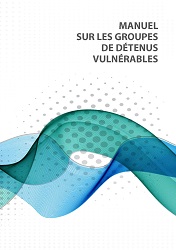
In prison, certain groups of inmates are subject to disadvantages due to specifics of their origin, gender, sexual orientation, age, etc. These groups usually need special treatment, which is not always provided, which leads to unequal treatment and violation of their rights. This handbook examines the situation of such vulnerable groups within the prison systems of Belgium, Bulgaria, Germany, Lithuania and Spain. Starting from the classification of the UN Handbook on Prisoners with special needs and looking at the different national contexts, the authors identify different groups as vulnerable in different countries. In order to encompass as many groups as possible, their list was extended to include some particularly marginalised groups, such as sex offenders, prisoners with disabilities, etc. Each group is viewed in context, explaining the situations of vulnerability both generally and in the selected countries. From one side, the handbook presents the efforts for compensation of vulnerabilities in every country available in the legislation or provided by prison authorities or other actors. From the other side, it identifies the gaps in the measures and practices, which vary both from country to country and from group to group.
More...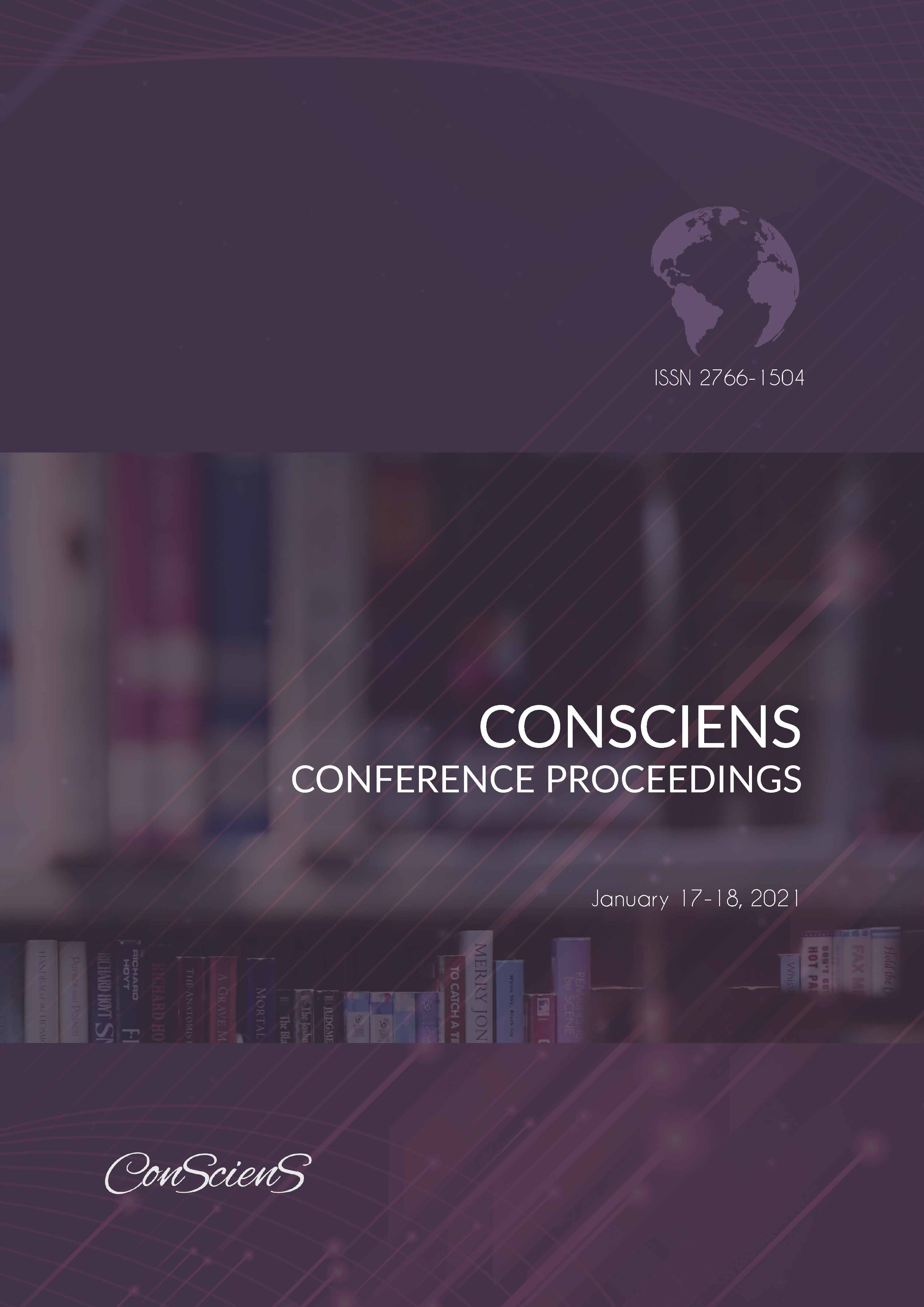
Controlling online child pornography has always been a challenge for the global community. The introduction, growth, and utilisation of information and communication technologies (ICTs) have been accompanied by an increase in illegal activities. With respect to cyberspace, children’s massive online presence and the rise of child pornography as a business are forcing all countries to adopt strong laws and collaborate internationally to tackle this threat. Recent online search trends indicate a manifold increase in the search for child pornographic material. Although there is a diversity of opinions on the definition of child pornography and the appropriate punishment, it is widely accepted that the Internet has exposed more children to pedophiles, mostly from poor countries. With respect to Egypt, almost 55% of the population has access to the Internet, and most Internet users access social networking sites. On such a basis, this article seeks to address and analyse the following issues: Firstly, the impact of ICTs on the spread of online child pornographic material and the techniques used by offenders. Secondly, an analysis of the existing legislative and regulatory framework and their efficiency in combating this form of organised crime will be provided, taking Egypt as a case study. Finally, the paper will conclude by discussing some recommendations that should be taken to protect children and society and minimise the risk of utilising ICTs in illegal criminal activities, especially with respect to child pornography.
More...
The Romanian Constitution guarantees the equality of citizens before the law and public authorities without privileges or discrimination, as well as the rights and freedoms of all persons. It also provides that no person shall be subjected to torture or to any other degrading or inhuman or degrading treatment or punishment. Following the legislative changes in 2004, the National Authority for the Protection of the Family and the Rights of the Child was born in Romania, which was established by taking over the attributions of the National Authority for the Protection of the Rights of the Child, the Pilot Center for Assistance and Protection of Victims of Domestic Violence of Information and Consultancy for the Family and of the National
More...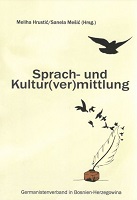
When Darko Cvijetić writes about skyscrapers in Prijedor in his novel Schindler's Lift, he doesn't think of the building as the epitome of human living. Nor is his literary impetus directed towards the events associated with this building. Basically, he is also not interested in the history of this city. He explicitly stands up for people, legitimizing his literary position through deep compassion for every victim of those skyscrapers of this city. The red and blue skyscraper are two of the tallest buildings in Prijedor. In 1975 the first tenants moved into the building. To this time all people still lived together and in peace. All those people celebrated and mourned together, as it was expected from a socialistic country, or from a multicultural Bosnia and Herzegovina. This multicultural country came into the focus of public attention some 15 years later, the difficult war years followed and the immediate post-war period. There is no narrative or narrator capable of understanding the horror of that war. No narrative could compare with the victims of the war. The literary intention of Darko Cvijetić was to prove this point.
More...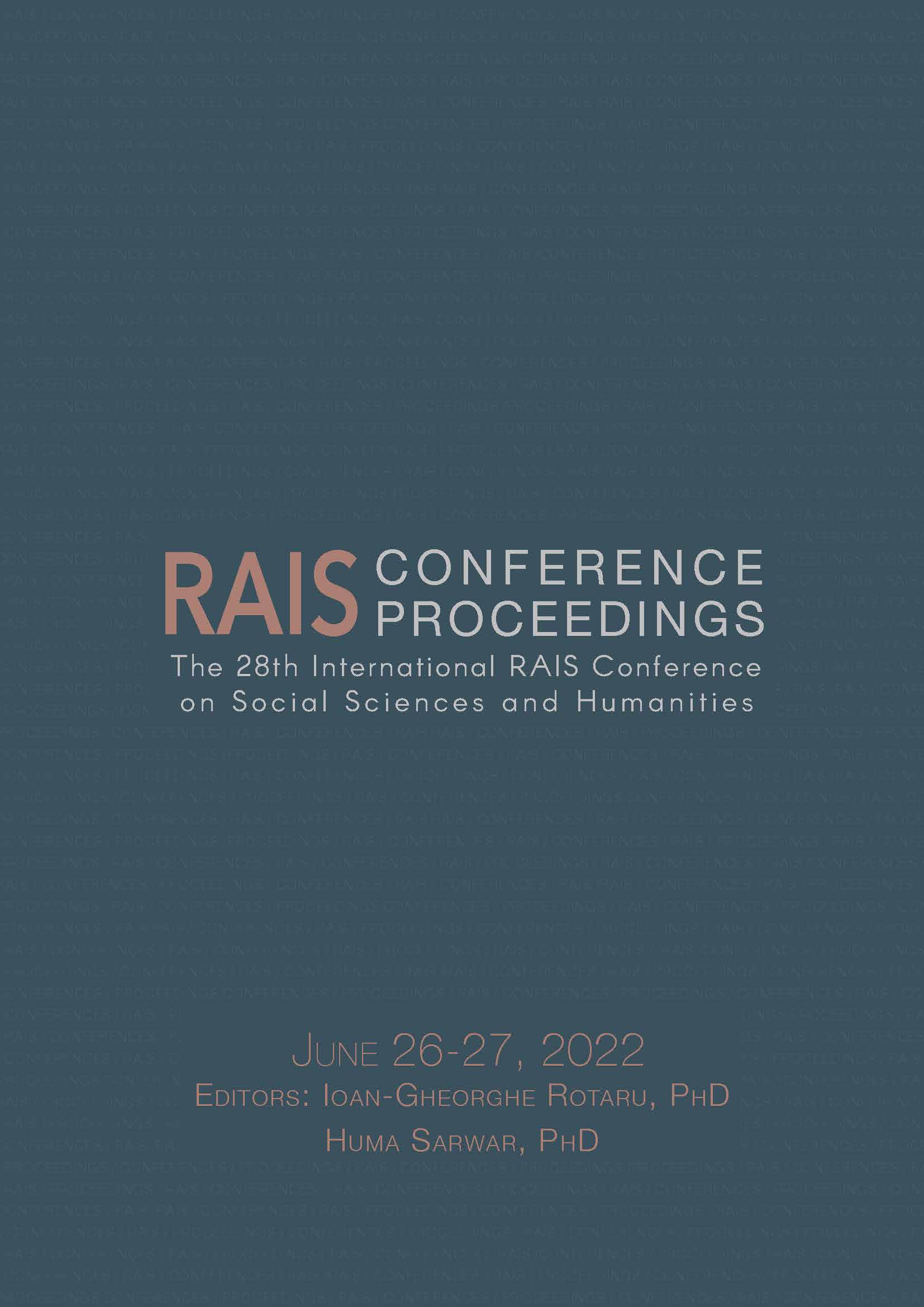
The recognized correlation between the growing spread of violent extremist and terrorist content on the Internet and online platforms and the significant increase of attacks inspired by these postings caused governments and security agencies to launch various countermeasures. These measures included removal of terrorist and violent extremist online content (or “deplatforming”), suspension of their social media accounts, hacking websites and pressuring social media companies to remove terrorist propaganda. Struggling to adjust to these countermeasures and sustain their online presence, terrorist and violent extremists moved from mainstream online platforms to alternative online channels including anonymous sharing portals and cloud services. The most popular archiving service used by various extremist and terrorist groups is the Internet Archive. While the few studies on hate speech and violent content on Internet Archive focused only on a certain type of content or a specific group, this study attempts to reveal a wide range of contents, groups and organizations who use this archive for sharing and promoting such contents. To examine the use of Internet Archive by various groups and organizations involved in violence, terrorism, hate speech, racism and neo-Nazism we applied several stages of data collection and analysis. The findings highlight an alarming volume of terrorist, extremist, and racist material on the Internet Archive. These findings are discussed in terms of ethical and practical implications.
More...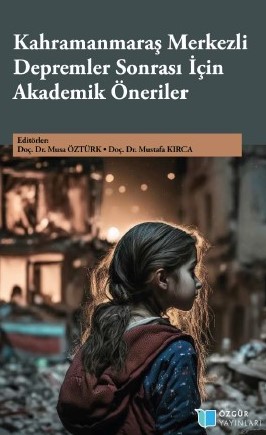
Yüksek şiddetli depremler sonrasında yaşanabilecek araç, ekipman ve personel eksikliği, istenmeyen bir durumdur. Bu tür durumlarda, canlı belirtisi alınamayan bir enkaza kaynak ayırmaktansa canlı belirtisi tespit edilebilen enkazlara kaynak ayırmak, hayat kurtarma ihtimalini arttırabilir. Enkaz altında canlı tespiti farklı teknolojiler kullanılarak yapılabilmektedir. Termal kamera, yılan kamera gibi cihazlarla ısı ve/veya görüntü ile canlı tespiti yapılabilir. Bunun yanı sıra, ses ve titreşim algılayacak sensörlere sahip cihazlar da kullanılabilir (Sun, Yang, Liu, Zu, & Xu, 2011). Örneğin, 6 Şubat Kahramanmaraş depreminde, DELSAR adı verilen cihaz (ATEK-A.Ş., 2023) ses titreşimindeki değişiklikleri elektrik sinyaline dönüştürerek duvar ötesinde canlı olup olmadığını algılayarak birçok hayat kurtarmaya zemin oluşturabilmiştir.
More...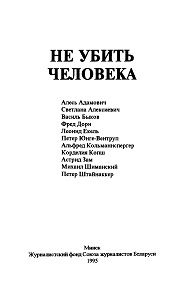
ABout the "Nadeshda" Center - Center of post-Chernobyl rehabiitation of children
More...